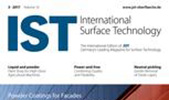Greasy fingerprints on shiny stainless steel surfaces not only look unattractive, they also attack the surface. In the future, a new nano-lacquer will prevent fingerprints from being left behind when touching stainless steel fronts. This is made possible by special nanoparticles that are added to the paint. The highlight is a coating with a varnish that contains special additives and is water- and oil-repellent. In addition, there are two other effects: If the integrated particles in the paint accumulate on the surface of the stainless steel, the surface becomes rougher and larger. If a finger touches the refrigerator door, for example, it only touches the surface at the raised points, while the finger grease does not reach the deeper valleys. The surface with which the finger grease comes into contact is therefore quite small. In addition, the refractive index of the varnish is set so that it corresponds to the fat content of the finger. This means that the light that falls on the coated stainless steel surface is reflected in approximately the same way as on a surface that is provided with a "finger patcher". Ergo: The fingerprint is hardly noticeable. While FEW Chemicals GmbH is responsible for developing the coating systems, the Fraunhofer Institute for Microstructures of Materials and Systems IMWS in Halle is dedicated to analyzing these layers. Using a combination of spectrometric and optical methods, a specially developed testing machine is to analyze the percentage of anti-fingerprint effect of the coating. The scientists are currently investigating which combination of analysis devices is the best for this purpose. The researchers have already found a favourite among the various coating systems investigated. Now the task is to further optimize it. The development should be completed by the end of 2020, when FEW Chemicals GmbH plans to transfer the production of the coating system to an industrial scale.
Autor(en): Ke







